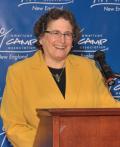Annual New England Camp Conference Offers Camp Professionals Education and More
As Maine’s hundreds of camp professionals look ahead to summer — hoping to fill remaining staff positions, communicating with families, and crossing their fingers for warm weather and snow melt — many also set aside a few days in late March to attend the annual conference of the American Camp Association New England.
The 2019 gathering, held March 28-30 in Manchester, NH, brought together approximately 900 camp personnel from throughout New England, says ACA New England Executive Director Bette Bussel. Vendors promoting a broad range of products and services at the conference Expo brought that number to nearly 1000, Bussel says. Between 80 and 90 presenters offered workshops over the three-day conference.The event was definitely a success, she says.
“I look at that from variety of ways.” Attendee feedback has been positive, Bussel says, adding that she also considers the “feel of the event.”
“This was a particularly good-feeling one. People were engaged, happy, enjoying what they were doing, and serious about sessions and keynotes,” she says. “They were still having fun, talking and meeting other people.”

Bussel says a particularly appealing element of the conference is the variety of attendees. “You have young people and also have seasoned camp professionals all together in one space, talking and sharing ideas.”
Given the history of camping in New England, that quality is special, she says.
“Camps began in New England,” Bussel says. “It’s the home for summer camp.” And in Maine, the home to many camps that have passed the century mark, generations of families have handed along information.
“That’s what we need to be doing, pass along amazing information.”
The annual conference also serves to connect camp personnel who tend to operate in “a vacuum,” Bussel says.
Many camps only have a single individual employed year-round, for example. Other camp personnel wear different professional hats when camp is not in session. For example, Bussel says, camps operated by social service agencies may enlist their camp director to fill non-camp roles during the winter months.
“Coming together with camps in similar situations is appealing,” she says. In addition, she says a regional conference like the New England event is more affordable than a national gathering.
The scope of information offered, and opportunity to connect with colleagues, also serves to help attendees “get ramped up for camp,” Bussel says. It allows them to say, “‘I’m really ready now.’”
Hundreds of camps operate throughout New England, and Bussel says ACA New England through its conference and programming continually seeks to serve the full scope: overnight, day, agency, and religious camps among them.

In planning conferences, Bussel and her staff, along with conference volunteers from the New England camping community, try to identify and meet particular concerns and challenges that camp directors face. ACA New England staff members tour camps throughout the summer, and also attend state association meetings. Both efforts help reveal concerns. Meetings held after the camp season season are also useful. Most recently, issues around the mental health of campers — as well as camp staff — have been a top topic of discussion, Bussel says.
One positive outcome is the hiring by some camps of a staff member focusing on MESH (mental, emotional, and social health) issues, she says. In addition, the 2019 conference placed a heavy emphasis on addressing such challenges.
Bussel says the organization is also continually considering the scope of what “camp” means.
“It can be in downtown Hartford, or in the woods,” she says, another affirmation of the view that camp directors and the ACA espouse.
“There really is a camp out there for everybody.”
Terri Mulks, director of Camp Susan Curtis in Stoneham, is a longtime presenter at the ACA New England conference. This year she also served on the conference planning committee. Among that committee’s tasks, Mulks says, are identifying camp professionals’ interests and needs, evaluating presentation proposals, and being mindful of potential presenters’ credentials and ability to connect with the camp community. In addition, Mulks says, planners need to account for the unique scope of the conference, which reaches both first year camp staff and longtime executive directors and owners.
Like Bussel, Mulks says topics of particular interest to camp professionals currently include MESH issues, social and emotional learning, and camper and staff anxiety challenges. A number of workshops, conducted by credentialed professionals familiar with the unique nature of a camp community, addressed such issues and concerns.
In fact, one of the two keynote speakers focused solely on managing anxiety. Lynn Lyons, LICSW, a Concord, NH-based clinician and author, both speaks nationally and has a private New Hampshire practice. She specializes in helping children and adults challenged by anxiety disorders.

Lyons’ animated presentation included strategies and skills that staff can teach to anxious campers. She also described the ways staff can both guide and collaborate with campers in approaching anxiety.
“Worry and anxiety are part of the human experience,” she told the audience. And removing “triggering events” that create such responses simply leaves youngsters “emotionally unequipped.”
Instead, Lyons believes kids need to learn to manage their worry and anxiety. That means understanding the actual process of worry, she said. If kids are taught how to recognize and “allow” their anxiety, and then “pivot,” they will actually be managing the challenge. Lyons described the process as “action over avoidance.”
Common approaches, Lyons said, such as accommodation and avoidance, can enhance anxiety; kids and adults alike benefit from changing patterns of thinking.
Mulks said several staff members from Camp Susan Curtis accompanied her to the conference this year. The information they gathered will fit largely into the camp’s leadership training and all-staff training later this spring. Mulks says some of that training will be conducted by staff members who joined her at the conference.
“I want [my staff] to hear things from people who are not me,” she says.
As Mulks described her role at the conference, she also described preparations for 2019 season at Camp Susan Curtis — and the challenge of the eight remaining inches of snow still covering camp property. Maine’s camp directors certainly can’t control ice and snow and mud, all of which linger well into spring. But many of them, and their staff members, who gathered for learning and sharing and collegiality at the 2019 ACA New England, are immersing themselves in ongoing opportunities for learning and growth. The snow and ice will melt, and the 2019 season will begin. When kids arrive for learning and growth experiences of their own, camp directors and their staffs will be ready. March in Manchester, or summer in Maine, the effort has a single focus: campers.